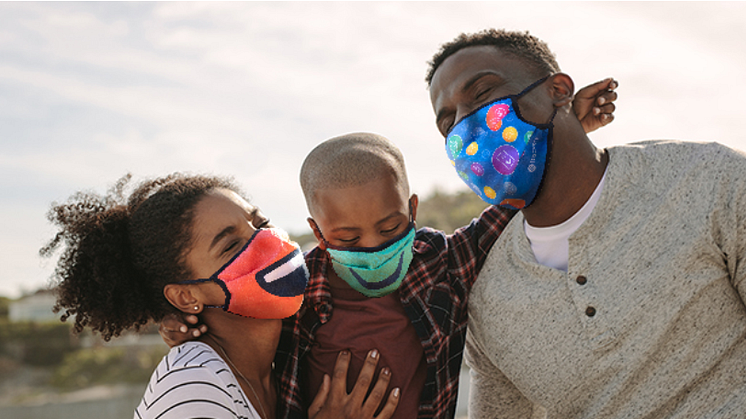
Press release -
Managing the second Wave – a plea for a collective response from all South Africans
14 December 2020 - With many South Africans preparing for a December break, daily new reported COVID-19 cases are at their highest levels since July and rapidly increasing. South Africa’s infection rates are following a strikingly similar trajectory to Europe’s second wave, peaking six to seven months after the initial outbreak.
Dr. Ryan Noach, CEO of Discovery Health cautions, saying “South Africa is now clearly in a second wave. The Eastern Cape and Western Cape, in particular, are currently experiencing a surge in new infections with a well-established second wave, and we fully expect the imminent emergence of a second wave in KwaZulu-Natal. Across these provinces Discovery’s data classifies a number of hotspot areas where additional precautions should be taken due to significantly elevated rates of active Covid-19 infections.” These areas include Port Elizabeth, East London, Uitenhage, Zwelitsha and Humansdorp in the Eastern Cape, and George, Mossel Bay, Plettenberg Bay, Knysna, Oudtshoorn, Stellenbosch and Somerset West in the Western Cape. A further 19 districts across these regions that have been identified as emerging hotspots are expected to experience a similar surge in infections within the new few weeks.
With many South Africans expected to travel to these regions over the holiday period, we can expect larger crowds and greater levels of social interaction. “These dynamics substantially heighten the risk of COVID-19 infection within these regions. Additionally, hospital capacity in these hotspot regions is limited and we anticipate it will come under severe strain with the influx of travelers from other provinces and should there be an expanded outbreak in these areas,” says Dr Noach, adding “strict collective adherence to COVID-19 protocols is therefore critical in mitigating the extent of the second wave and significant potential squeeze on hospital bed capacity, particularly ICU beds and ventilators.”
The importance of keeping R < 1.4
The spread of the second wave and the extent to which it impacts the South African healthcare system is dependent on the rate at which the virus spreads, known as the reproduction rate of the virus (R). R describes the number of secondary cases expected from a single infected person in a population. An R of 1 implies that every infected person, during the course of their infection, only passes the virus onto one additional person. As a result, the number of people at any given time stays stable. An R of above 1 means that every infected person passes the virus on to more than one additional person, resulting in growth of the aggregate number of infections in the population. Any R above 1, even if only slightly above 1, leads to exponential growth in the number of infected individuals. Our target as a country should be to reduce R to below 1, through social distancing, contact tracing and appropriate prudence.
At the time of writing, South Africa’s R is 1.4[1] with KwaZulu-Natal R at 1.9, Gauteng R at 1.7 and the Western Cape R at 1.4. This implies significant spread of infection within these provinces and potential spread of the second wave across the country.
Based on the SAMRC reports and Discovery’s extrapolations, it is estimated that approximately 30% of South Africans have already been infected with COVID-19. Under this assumption, Discovery Health’s outbreak modeling suggests that maintaining an R lower than 1.4 is critical in avoiding the spread of the second wave. If infections in a particular area go beyond this level, the virus starts spreading at uncontrollable rates, with infections reaching high peaks shortly thereafter.
A case study of post-matric 2020 celebration events
Breakdowns in physical distancing and large gatherings, have resulted in significant surges in COVID-19 infections over the last two months. Events where a single infected individual can cause a disproportionately large number of secondary infections are classified as superspreader events, and have been increasingly prominent as COVID-19 restrictions have eased.
On the 6th of December 2020, the Department of Health classified the year-end matric celebration event on the KwaZulu-Natal North Coast, as a superspreader event. Young adults from across the country travelled to Umhlanga and Ballito for these events and despite the range of preventive that were put in place to prevent potential spread of infection, large gatherings, close contact and non-compliance to preventive measures resulted in widespread infection among attendees.
Post-matric event classified as a superspreader event:
- Over 80% of attendees tested positive for Covid-19
- Majority travelled home, carrying the virus asymptomatically to other regions
- In 40% of cases involving young adults, other family members on the policy test positive shortly thereafter
- Local communities experienced rapid increases in R post the event
Initial pathology reports indicate that over 80% of individuals who were tested following the post-matric event in Umhlanga and Ballito tested positive for COVID-19[2]. “Discovery’s data also shows that the proportion of positive tests in young adults increased by 3.6times across the country in the first week of December, significantly more than the increases seen across other age categories,” adds Dr Noach.
Pathology data suggests that many young adults attending these events returned home entirely asymptomatic, but infected and probably spreading the virus. Of importance, the majority of the positive tests in these young adults were received in their hometowns, demonstrating that the virus was transported across the country with a high likelihood of many contacts and potential further spread events. In addition, initial data analysis shows that approximately 40% of immediate family members on the same policy also received positive COVID-19 diagnoses within the week to ten days thereafter. “This strongly suggests that infections were passed on from young adults returning from post-matric events to their families,” says Dr Noach.
The local community hosting this event has also been significantly impacted with a rapid rise in R, currently recorded at 1.51[3] and still on the rise, on the KwaZulu-Natal North Coast. These are the highest Rs recorded in the Dolphin Coast region since the peaks of the pandemic.
While Discovery’s data shows that 94%[4] of confirmed infections in young adults, manifest in asymptomatic or mildly symptomatic infection, older adults over the age of 60 and high risk individuals have been experiencing the brunt of the second waves already recorded. The proportion of infections from higher risk groups has increased 1.6 times in the Eastern Cape second wave, with a 17% increase in hospitalisation within this group.
The impact of superspreader events
Limited adherence to preventing superspreader events has unfortunately caused the reproduction rate of the virus to be as high as 1.8 in the Greater Garden Route region. KwaZulu-Natal has already recorded R values of 1.9 through the first week of December and this continues to increase. Dr Noach warns that “under these elevated R rates in densely populated regions, COVID-19 infections are projected to surge and peak simultaneously, with a projected national peak in January 2021.”
The impact of simultaneous and sudden infection spread could have severe implications for hospital bed capacity, particularly in the temporarily over-crowded coastal regions. The Eastern Cape, and more specifically the Nelson Mandela Bay region, has already shown the first warning signs, coming close to exceeding capacity of the private healthcare system, and calling on medical reinforcements from other regions to assist with managing their second peak[5]. The Garden Route, including Knysna, Plettenberg Bay and George are also experiencing shortages in hospital beds with patients needing to be moved by emergency services, where appropriate, to other parts of the country, where there are still sufficient hospital beds available.
A collective response is needed from all South Africans to limit the impact of the second wave
South Africa has the capability of limiting the impact of a second wave (and reducing R to less than 1). International research, by the University of Cambridge and Greenwich demonstrated strong evidence that routine facemask use by just 50% or more of the population reduced COVID-19[6] spread to an R less than 1, resulting in flatter future disease waves and allowing for less-stringent lockdowns.
Limiting the impact of the second wave is heavily reliant on the collective efforts of all South Africans to maintain simple and routine preventative measures, including:
- Wearing a mask in all public areas
- Continuing to practice good hygiene protocols
- Maintaining physical distancing
- Avoiding large gatherings of people
- Self-isolating when potentially exposed to the virus
"The timing of this second wave, and the location of hotspots is concerning, considering it converges with the migration of holiday makers to these same regions. However, we urge holiday makers, especially individuals over 60 years and or those who have a chronic condition that places them at a higher risk for severe COVID-19 illness, reconsider any travel plans to hotspot areas, currently including Nelson Mandela Bay, the Garden Route and Buffalo City.
We realise that this has been a difficult and complicated year, and that this holiday season represents a welcome reprieve from the pressure of the past months. Consequently, we are aware of the difficulties that this specific request to reconsider travel plans causes.
Despite the welcome family time and relief that this holiday period promises, please do recognise the risks that your travel to hotspot areas raises.
Although a potential vaccine should be available during 2021, the responsibility is in every South African’s hands to help manage the second wave of COVID-19 as effectively as we did the first,” concludes Dr Noach.
For more information, contact:
Nthabiseng Chapeshamano
Senior Reputation Manager
nthabisengc@discovery.co.za/media_relations_team@discovery.co.za
084 037 1951
[1] Reproductive.live (https://reproduction.live/world/ZA)
[2] Next biosciences pathology labs; https://www.iol.co.za/news/health-minister-slams-matric-year-end-parties-after-teens-test-positive-for-covid-19-007a69f9-ee7e-4f74-8a5c-82fa4363fcf4
[3]Recorded as at 3 December 2020
[4]Potentially understated as asymptomatic individuals are unlikely to test for COVID-19.
[5]https://www.enca.com/news/covid-19-eastern-cape-premier-calls-medical-reinforcements
[6] A modelling framework to assess the likely effectiveness of facemasks in combination with ‘lock-down’ in managing the COVID-19 pandemic, The Royal Society, https://royalsocietypublishing.org/doi/10.1098/rspa.2020.0376
Topics
Discovery information
About Discovery
Discovery Limited is a South African-founded financial services organisation that operates in the healthcare, life assurance, short-term insurance, savings and investment and wellness markets. Since inception in 1992, Discovery has been guided by a clear core purpose – to make people healthier and to enhance and protect their lives. This has manifested in its globally recognised Vitality Shared-Value insurance model, active in 24 markets with over 20 million members. The model is exported and scaled through the Global Vitality Network, an alliance of some of the largest insurers across key markets including AIA (Asia), Ping An (China), Generali (Europe), Sumitomo (Japan), John Hancock (US), Manulife (Canada) and Vitality Life & Health (UK, wholly owned). Discovery trades on the Johannesburg Securities Exchange as DSY.
Follow us on Twitter @Discovery_SA







